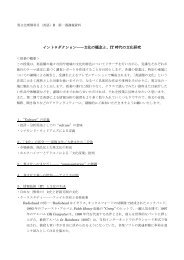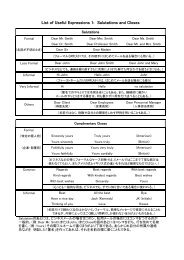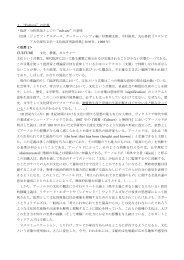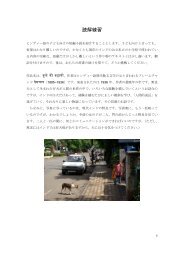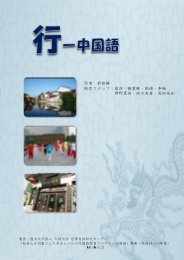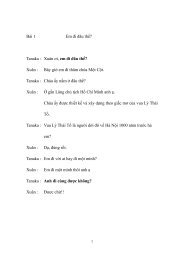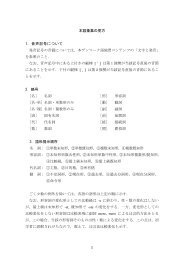4 - 大阪大学世界言語eラーニングサーバ
4 - 大阪大学世界言語eラーニングサーバ
4 - 大阪大学世界言語eラーニングサーバ
You also want an ePaper? Increase the reach of your titles
YUMPU automatically turns print PDFs into web optimized ePapers that Google loves.
disproportionate. Most were small-time thieves. Britain wasn’t trying to rid itself of dangerous<br />
criminals so much as thin our an underclass. The bulk were being sent to the ends of the earth for<br />
stealing trifles. One famously luckless soul had been caught taking twelve cucumber plants. Another<br />
had unwisely pocketed a book called A Summary Account of the Flourishing State of the Island<br />
Tobago. Most of the crimes smacked either of desperation or of temptation unsuccessfully resisted.<br />
Generally the term of “transportation” was seven years, but since there was no provision for their<br />
return and few could hope to raise the fare, passage to Australia was effectively a life sentence. But<br />
then this was an unforgiving age. By the late eighteenth century Britain’s statute books were<br />
weighty with capital offenses; you could be hanged for any of two hundred acts, including, notably,<br />
“impersonating an Egyptian.” In such circumstances, transportation was quite a merciful alternative.<br />
(Bryson 48-49)<br />
The gold rush transformed Australia’s destiny. Before it, people could scarcely be induced to settle<br />
there. Now a stampede rose from every quarter of the globe. In less than a decade, the country took<br />
in 600,000 new faces, more than doubling its population. The bulk of that growth was in Victoria,<br />
where the richest goldfields were. Melbourne became larger than Sydney and for a time was<br />
probably the richest city in the world per head of population. But the real effect of gold was to put an<br />
end to transportation. When it was realized in London that transportation was seen as an<br />
opportunity rather than a punishment, the convicts desired to be sent to Australia, the notion of<br />
keeping the country a prison became unsustainable. A few boatloads of convicts were sent to Western<br />
Australia until 1868 (they would find gold there as well, in equally gratifying quantities) but<br />
essentially the gold rush of the 1850s marked the end of Australia as a concentration camp and its<br />
beginning as a nation. (Bryson 80-81)<br />
I. Parks in Australian cities: a British heritage<br />
Central Adelaide boasts almost eighteen hundred acres of parks, less than Canberra, but a great<br />
deal more than most other cities of its size. As so often in Australia, they reflect an effort to recreate<br />
a familiarly British ambience in an antipodean setting. Of all the things people longed for when they<br />
first came to Australia, an English backdrop was perhaps the most outstanding. It is notable, when<br />
you look at early paintings of the country, how awkward, how strikingly un-Australian, the<br />
landscape so often appears. . . . Australia was a disappointment to the early settlers. They ached for<br />
English air and English vistas. So when they built their cities, they laid them out with rolling<br />
English-style parks arrayed with stands of oak, beech, chestnut, and elm. . . . Adelaide is the driest<br />
city in the driest state in the driest continent, but you would never guess it from wandering through<br />
its parks. Here it is forever Sussex. (Bryson 124)



